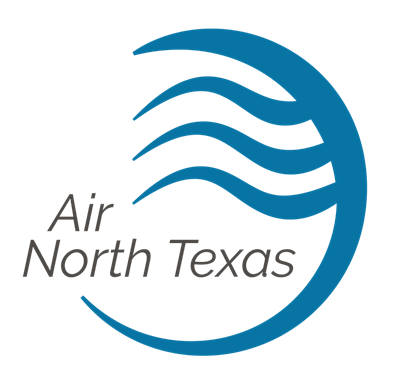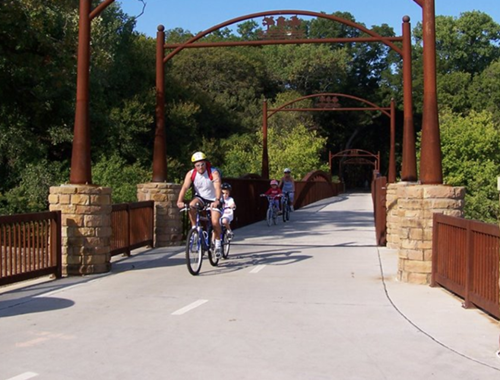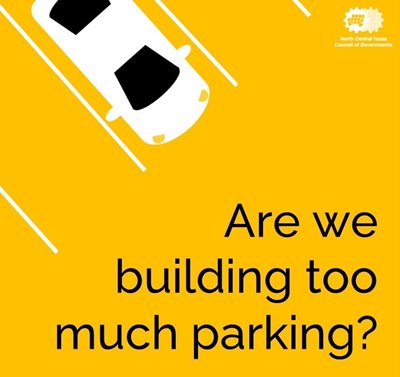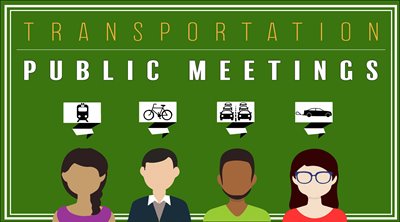Marching into ozone season
 Ozone season is here. So, it is time to put some clean air habits to use. Ozone season, which continues through November 30, is the time of year when ground-level ozone, a common air pollutant, reaches its highest concentration. Coughing, irritation of the throat, chest tightening, or shortness of breath are all symptoms people can experience during days with high levels of ozone.
Ozone season is here. So, it is time to put some clean air habits to use. Ozone season, which continues through November 30, is the time of year when ground-level ozone, a common air pollutant, reaches its highest concentration. Coughing, irritation of the throat, chest tightening, or shortness of breath are all symptoms people can experience during days with high levels of ozone.
Currently, 10 Dallas-Fort Worth area counties remain in nonattainment for ozone, although the region has improved significantly over the past two decades. A few small changes can help you take action during ozone season.
Work from Home. Those with the option to telecommute can save money by reducing commuting costs, leading to lower emissions during ozone season and throughout the year.
Take a Carpool or Transit. Both carpooling and public transit offer easy ways to reduce emissions. Not sure what the advantages of taking this route might be? Learn more here.
Reduce Idling. Idling engines reduce fuel economy, cost money and create pollution.
Conserve Water. Take shorter showers and limit baths. When we waste less water, we conserve fuel and reduce the pollution generated by burning fuel. Learn about your local watering rules here.
Save Electricity. Electricity use can have a major impact on our footprint, especially during ozone season. Use less energy in your home. You can learn more about conserving electricity here.
Join us at www.airnorthtexas.org/getinvolved and commit to clean air actions, sign up for air pollution alerts and improve our region’s air quality.
North Texans can help rebrand Fort Worth to Dallas Regional Trail
 |
| Residents can help rebrand a regional bike trail that runs through five North Texas cities. A virtual open house will be held this spring. |
NCTCOG is looking to rebrand the 66-mile bicycle-pedestrian trail connecting Fort Worth and Dallas. And residents are being asked to help.
A project is underway to create a new name, brand, wayfinding system and other recommendations for the Fort Worth to Dallas Regional Trail. Over 50 miles of the trail are open, spanning Fort Worth, Arlington, Grand Prairie, Irving and Dallas. The trail is expected to be completed in late 2023 or early 2024. The trail is envisioned as a regional, state, and nationwide attraction for recreation, tourism and large events.
NCTCOG is collaborating with stakeholders from the five cities and groups such as tourism bureaus, sports event organizations, bike groups, river and natural environmental advocacy groups, and cultural groups seeking a new identity for this facility while maintaining the identity of individual segments.
Additional public engagement has been solicited through virtual open houses. Another opportunity is planned for spring, allowing participants to review draft concepts for trail names and branding, rank them, and provide feedback. Final feedback on branding,wayfinding and other recommendations will be sought at a virtual open house set for the summer.
By the fall, this effort is expected to be complete, resulting in a new name, logo, and branding materials, as well as a wayfinding signage package; and other recommendations.For more information about the Fort Worth to Dallas Regional Trail and the branding project, visit www.nctcog.org/FWtoDalTrail. To sign up for the email list and be notified of the opening of the virtual open house, visit www.FortWorthtoDallasTrail.com.
Call for projects could advance adoption of electric vehicle, reduce emissions
NCTCOG will offer public-sector entities in the 10-county ozone nonattainment region grant funding for the installation of electric vehicle charging stations. The Regional Transportation Council authorized the plan Feb.10 to make $1 million available through a competitive call for projects to fund installation and construction of charging stations at strategic locations. While hundreds of charging stations are publicly available regionwide, they are not evenly distributed. NCTCOG hopes to fill the gaps in availability to encourage more widespread adoption of electric vehicles by public-sector fleets and private residents.
Interested fleets have until April 22 to apply for funding. If any money remains, a second round will open, with an application deadline of May 20. Many surveyed public vehicle fleet operators have indicated an interest in electrifying, citing lack of infrastructure as a barrier to adoption of EVs. All public-sector entities will be eligible to participate in the call for projects, pending their adoption of the RTC’s Clean Fleet Policy. Chargers must be located with existing parking and development, meet federal Buy America standards and be complete and operational by July 31, 2023. Costs covered will include the design, engineering, purchase, installation and construction of Level 2 and Direct Current Fast Charge EV charging stations. NCTCOG will host an informational webinar to go over the call for projects on Monday, March 7 at 11 am. Register here.
NCTCOG launching study to help determine better parking practices
 NCTCOG is launching a study to inform the Regional Parking Utilization Database, a tool intended to help developers and policymakers determine the right amount of parking for apartments, restaurants, retail establishments and other commercial buildings in our region. More local data on parking utilization could ultimately lead to more walkable developments in a region expected to add nearly 4 million residents by 2045. Better data on parking use in our region is essential. Ultimately, this can lead to the identification of parking shortages and expose parking surpluses. More efficient parking data may uncover an opportunity to build more efficient cities that contain fewer unused parking spaces and more of everything else. effective parking may lead to affordable housing through reduced costs associated with parking construction.
NCTCOG is launching a study to inform the Regional Parking Utilization Database, a tool intended to help developers and policymakers determine the right amount of parking for apartments, restaurants, retail establishments and other commercial buildings in our region. More local data on parking utilization could ultimately lead to more walkable developments in a region expected to add nearly 4 million residents by 2045. Better data on parking use in our region is essential. Ultimately, this can lead to the identification of parking shortages and expose parking surpluses. More efficient parking data may uncover an opportunity to build more efficient cities that contain fewer unused parking spaces and more of everything else. effective parking may lead to affordable housing through reduced costs associated with parking construction.
NCTCOG’s Regional Parking Utilization Database will be an ongoing collection of regional parking data from parking facilities with data and findings accessible online. NCTCOG is calling on property managers and owners from across the 12-county region to volunteer properties for parking utilization counts.
Parking use will be observed on-site by NCTCOG staff during peak hours over two to three days in 2022 or 2023. Data will be provided to property managers and owners at the end of the study for their parking management and operations use.
If interested parties have completed their own studies or data collection, they are encouraged to share their findings with NCTCOG, so the database becomes a central clearinghouse of parking data. The study will concentrate on commercial property types, including industrial and warehouse uses; entertainment, theaters and gyms; restaurants, retail, office, hospitality and hotels; multi-family residential/apartments; and mixed-use sites. To submit a property to participate in the study, fill out the survey at www.nctcog.org/parking or recommend participation in this effort among your professional networks. For questions, contact Catherine Osborn at cosborn@nctcog.org
or visit www.nctcog.org/parking.
Transit agencies modify vanpool program
The North Central Regional Vanpool Program has been modified due to Dallas Area Rapid Transit’s (DART) vanpool contractor’s inability to secure vehicles for program participants as a result of the ongoing pandemic and related semiconductor chip shortage.
To ensure that the program can continue to effectively serve the region, the Regional Transportation Council (RTC) approved updates to the service areas operated by Trinity Metro and the Denton County Transportation Authority (DCTA).
Future vanpool customers in Collin, Denton, Hunt, Kaufman and Rockwall counties will be served by the DCTA. Trinity Metro will operate new vanpools in Dallas, Ellis, Erath, Hood, Johnson, Navarro, Palo Pinto, Parker, Somervell, and Tarrant counties. Both transit providers will share service in Wise County.
Vanpools operated by DART have been absorbed by Trinity Metro, therefore users may continue to share rides to work without interruption. DART had previously operated vanpools in Dallas, Ellis, Collin, Hunt, Kaufman, Navarro and Rockwall counties.
The new boundaries are temporary, as work continues on the establishment of one regionwide vanpool program, which is expected to debut in Fiscal Year 2025.
NCTCOG to give project updates March 14
 NCTCOG will share updates on current and upcoming projects at its next hybrid public meeting at noon on Monday, March 14.
NCTCOG will share updates on current and upcoming projects at its next hybrid public meeting at noon on Monday, March 14.
Topics to be presented include an update to the region’s long-term transportation plan, Mobility 2045, and project proposals for the Automated Vehicles 2.0 (AV2.0) initiative.
As the Dallas-Fort Worth area’s Metropolitan Planning Organization, NCTCOG is responsible for developing and maintaining a Metropolitan Transportation Plan. Staff has initiated an update to Mobility 2045, the current MTP, and will present details on the plan’s timeline and official public comment period.
NCTCOG staff is seeking approval from the RTC for a second round of project proposals for the Automated Vehicle 2.2 and 2.3 programs. The first round of projects was approved in July 2021.
The purpose of AV2.0 is to deepen transportation innovation within the region, provide a level playing field for all communities to participate, and apply relevant technology solutions to transportation challenges in situations where the market may lag.
A presentation on NCTCOG’s Regional Parking Utilization Database will also be given. The goal of the database is to study the demand and options for more efficient parking in the Dallas-Fort Worth area.
Finally, staff will present an overview of the 2023-2026 Transportation Improvement Program, a federally and State-mandated list that includes projects with committed funding from federal, State and local sources.
Attend in person, watch the presentations live at www.nctcog.org/input or participate via phone by dialing 855-925-2801 then code 6339. A video recording will be made available afterward. For special accommodations, contact Thao Tran at 817-704-2510 or tctran@nctcog.org at least 72 hours prior to the meeting.
--Images by NCTCOG and Getty Images